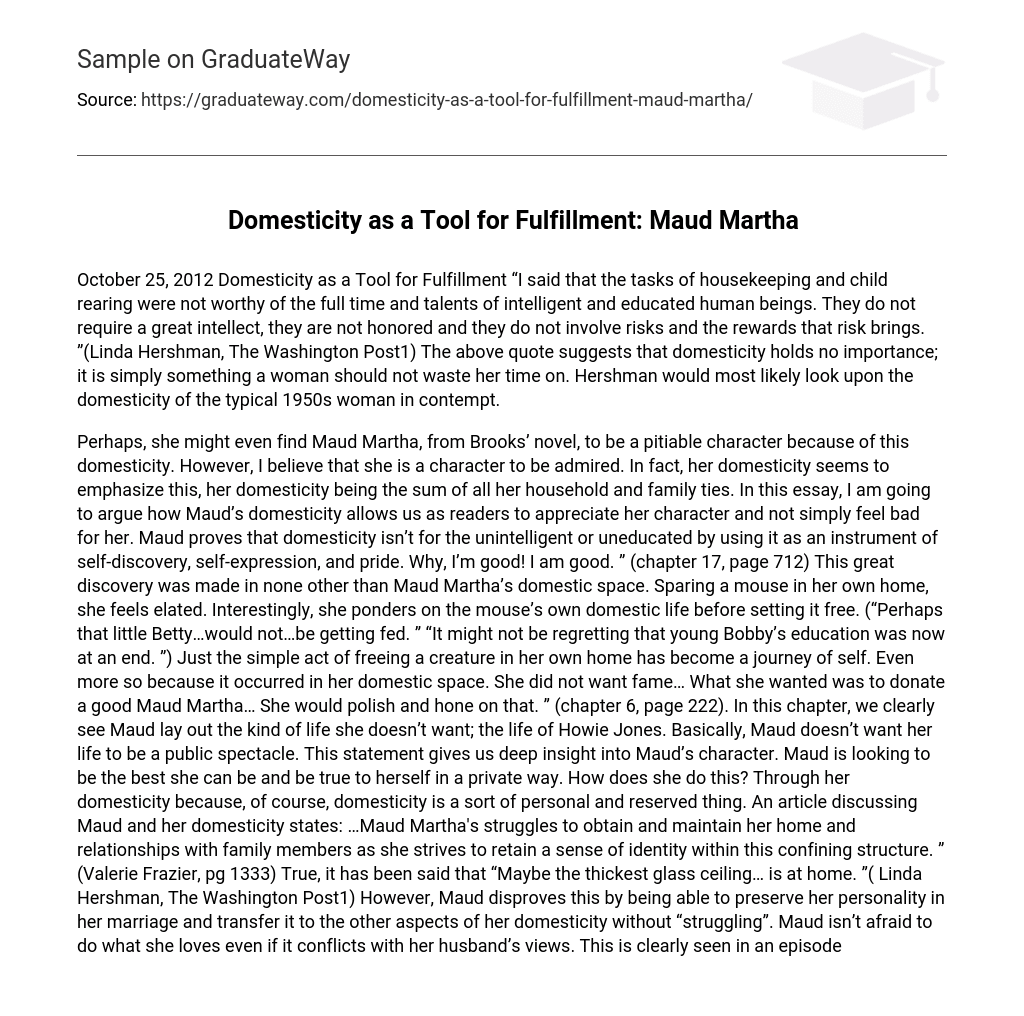October 25, 2012 Domesticity as a Tool for Fulfillment “I said that the tasks of housekeeping and child rearing were not worthy of the full time and talents of intelligent and educated human beings. They do not require a great intellect, they are not honored and they do not involve risks and the rewards that risk brings. ”(Linda Hershman, The Washington Post1) The above quote suggests that domesticity holds no importance; it is simply something a woman should not waste her time on. Hershman would most likely look upon the domesticity of the typical 1950s woman in contempt.
Perhaps, she might even find Maud Martha, from Brooks’ novel, to be a pitiable character because of this domesticity. However, I believe that she is a character to be admired. In fact, her domesticity seems to emphasize this, her domesticity being the sum of all her household and family ties. In this essay, I am going to argue how Maud’s domesticity allows us as readers to appreciate her character and not simply feel bad for her. Maud proves that domesticity isn’t for the unintelligent or uneducated by using it as an instrument of self-discovery, self-expression, and pride. Why, I’m good! I am good. ” (chapter 17, page 712) This great discovery was made in none other than Maud Martha’s domestic space. Sparing a mouse in her own home, she feels elated. Interestingly, she ponders on the mouse’s own domestic life before setting it free. (“Perhaps that little Betty…would not…be getting fed. ” “It might not be regretting that young Bobby’s education was now at an end. ”) Just the simple act of freeing a creature in her own home has become a journey of self. Even more so because it occurred in her domestic space. She did not want fame… What she wanted was to donate a good Maud Martha… She would polish and hone on that. ” (chapter 6, page 222). In this chapter, we clearly see Maud lay out the kind of life she doesn’t want; the life of Howie Jones. Basically, Maud doesn’t want her life to be a public spectacle. This statement gives us deep insight into Maud’s character. Maud is looking to be the best she can be and be true to herself in a private way. How does she do this? Through her domesticity because, of course, domesticity is a sort of personal and reserved thing. An article discussing Maud and her domesticity states: …Maud Martha’s struggles to obtain and maintain her home and relationships with family members as she strives to retain a sense of identity within this confining structure. ” (Valerie Frazier, pg 1333) True, it has been said that “Maybe the thickest glass ceiling… is at home. ”( Linda Hershman, The Washington Post1) However, Maud disproves this by being able to preserve her personality in her marriage and transfer it to the other aspects of her domesticity without “struggling”. Maud isn’t afraid to do what she loves even if it conflicts with her husband’s views. This is clearly seen in an episode between Maud and Paul.
After coming back from a night out, he wants to have sex. However, she wants to read and resists these advances. She, however, does not neglect her wifely duties and offers to make them both a snack (chapter 16, page 672). This shows us that Maud is not a defiant housewife, but one that stays true to herself and still performs her domestic duties regardless. Especially so, in “…the days when any housewife who didn’t want to have sex with her husband could be lobotomized. ” (Linda Hershman, The Washington Post1) Branching off of this, we can notice that not only does she perform her domestic duties, she feels a sense of pride over them.
This can be illustrated in the following statement Maud makes to her mother when her sister, Helen is brought up. “I have a lot of things. I have more than she has. I have a husband, a nice little girl, and a clean home of my own. ” (chapter 32, page 1672) One might perceive this statement as one solely made because of the rivalry between the sisters. However, on closer inspection, we see that Maud can boast of her domesticity because she is genuinely proud of it. Having a tidy domestic space and a marriage and a child is more than enough for her. Another instance of this pride can be seen in the “kitchenette folks” chapter.
At first glance, this chapter just seems to describe the people who live in the kitchenette with Maud. But, as we dive deeper, a trend that can be noticed is that Maud seems to mainly describe the other women living in the kitchenette and their “domestic sins” (chapter 23, page 109). As if describing these women and discovering who they were in their households was really a way of comparing her domesticity as “superior” to their own. We see Maud Martha use her domesticity in a way that is a bit uncommon for most housewives of the 1950s. She uses it as a tool to make her life fulfilling and not stifling (based on some modern feminist views).
Through her domesticity, we learn how strong a character Maud is. Better, in my opinion, if another instrument was used. Citation: 1 Hershman, L. (2006, June 18). Unleashing the Wrath of Stay-at-Home Moms. The Washington Post on the Web. Retrieved October 5, 2012, from http://www. washingtonpost. com/wp-dyn/content/article/2006/06/16/AR2006061601766. html. 2 Brooks, Gwendolyn. Maud Martha. New York: Harper and Row Publishers, 1953. Print 3 Frazier, Valerie. “Domestic Epic Warfare in Maud Martha”. African American Review: 39. 1-2 (2005 Spring-Summer)pp. 133-41





